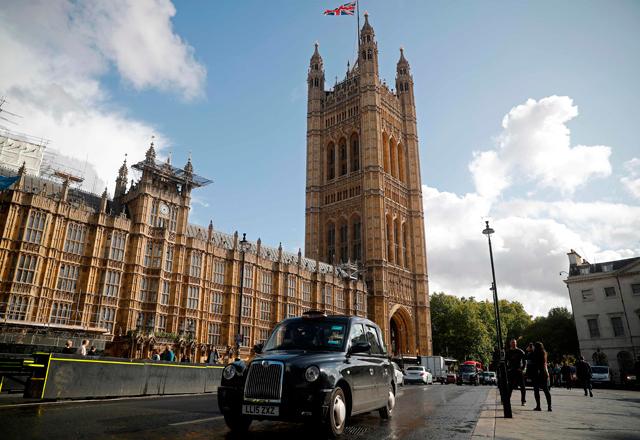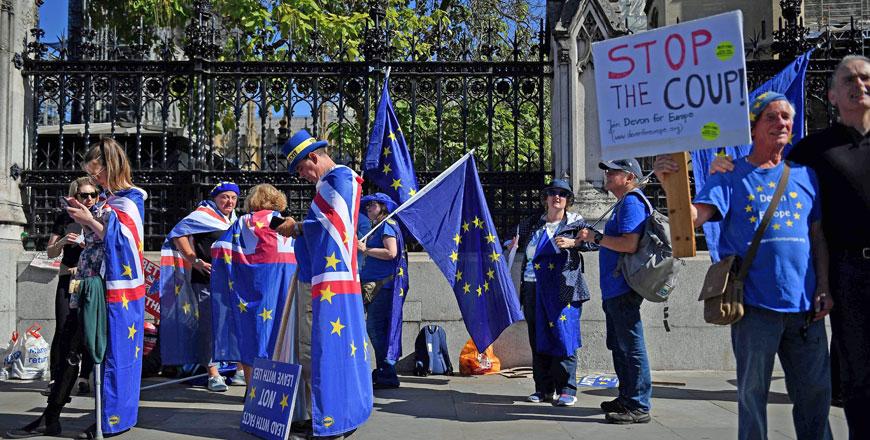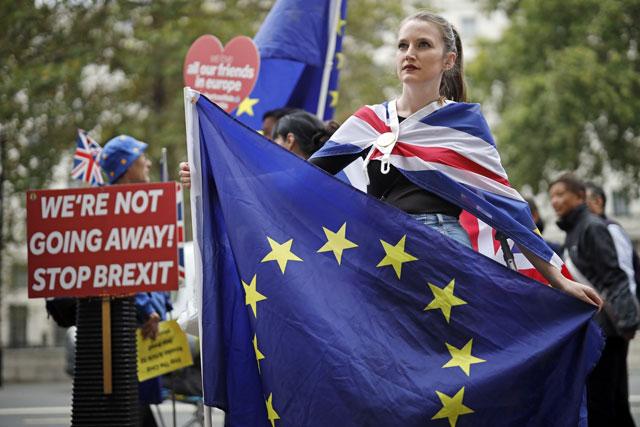You are here
Supreme court to rule next week on UK parliament suspension
By AFP - Sep 19,2019 - Last updated at Sep 19,2019

Anti-Brexit campaigner Gina Miller arrives at the supreme court in central London on the third and final day of the hearing into the decision by the government to prorogue parliament on Thursday (AFP photo)
LONDON — Britain's supreme court announced on Thursday it will rule next week on whether Prime Minister Boris Johnson acted unlawfully in shutting down parliament in the final weeks before Brexit.
Following three days of intense arguments as the Brexit battle switched to the highest court in the land, judges are set to decide on Johnson's advice to Queen Elizabeth II to suspend parliament for five weeks to October 14.
If the verdict goes against the premier, it could see parliament rapidly reassemble and would inevitably trigger questions about the prime minister's position if he was found to have mislead the monarch.
Johnson, who took office on July 24, insists suspending or proroguing parliament was a routine and long-overdue move to launch a fresh legislative programme.
But it sparked legal action accusing him of trying to silence MPs, who oppose his insistence on leaving the EU on October 31 without a divorce deal, if one cannot be agreed with Brussels.
Supreme court president, Brenda Hale, stressed that the verdict would not determine when and on what terms Britain leaves the European Union.
"We are solely concerned with the lawfulness of the prime minister's decision to advise Her Majesty to prorogue parliament on the dates in question," she said.
"It is not a simple question and we will now consider carefully all the arguments which have been presented to us.”
"But we also know that this case must be resolved as quickly as possible and we hope to be able to publish our decision early next week."
Courts risk 'minefield'
The supreme court judges heard appeals against two conflicting lower court decisions on Johnson's move.
Scotland's highest civil court found the suspension was unlawful, but the high court in England said it was not a matter for judges to intervene in.
David Pannick, representing campaigners appealing against the high court ruling, argued that judges did have the right to decide the proper scope of the prime minister's power to advise the head of state on shuttering parliament.
"This five-week prorogation has prevented parliament from carrying out its scrutiny functions over the executive over a period of exceptional length... for no rational reason," he said.
But Advocate General Richard Keen, the British government's top Scottish legal adviser contesting the Edinburgh court decision, said it would see the courts straying into an "ill-defined minefield" beyond their remit.
"The length of each session of parliament and the frequency of each session is regulated by constitutional convention — and not by the law," he asserted in conclusion.
"This is forbidden territory. It is a matter between the executive and parliament."
He said Johnson "would take all necessary steps to address any decision of the court" if the ruling went against him.
Major slams Johnson
Earlier on Thursday, a lawyer for former prime minister John Major said Johnson's reasons for suspending parliament "cannot be true", in a dramatic legal attack by one former Conservative leader on another.
The 1990s premier believes Johnson was acting entirely in his own political interests to avoid scrutiny by MPs as Brexit comes to the crunch, lawyer Edward Garnier told the court.
Major questioned why Johnson would not explain his motivations in writing.
"The only conceivable explanation is that the true reasons, if disclosed, would be adverse to his case," Garnier said in a written submission.
Major believes it is "inescapable" that Johnson's decision was motivated "by his political interest in ensuring that there was no activity in parliament" ahead of a crucial EU summit on October 17-18.
The lawyer added: "It would be very straightforward for the prime minister or a senior official to sign a witness statement confirming [for example] that the decision had nothing to do with Brexit if that were indeed the case.”
"Despite repeated requests nobody has been prepared to do so."
Record interest
The week before parliament was suspended, MPs rushed through legislation demanding Johnson ask the EU to delay Brexit if he has not agreed divorce terms in time.
He is now racing to try to agree a deal with Brussels to meet his October 31 deadline — although EU leaders say he has yet to offer formal proposals.
In a rare step, the maximum 11 of the 12 supreme court judges sat in the hearings — ensuring there cannot be a tied decision.
The case has attracted huge public interest. A record 4.41 million connections were made to the court's live stream footage on its opening day on Tuesday.
Related Articles
LONDON — Sterling bounced briefly on Tuesday after Britain's Supreme Court ruled "unlawful" a decision by Prime Minister Boris Johnson to su
LONDON — Prime Minister Boris Johnson said Thursday Britain will be ready for a no-deal Brexit on October 31 despite his own government's as
LONDON/EDINGURGH — British Prime Minister Boris Johnson suffered a fresh blow on Wednesday when a Scottish court ruled that his controversia


















